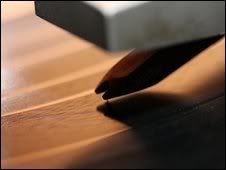
My original list:
1. Wilco, Yankee Hotel Foxtrot
2. Sonic Youth, Murray Street
3. Afel Bocoum, Damon Albarn, Toumani Diabaté and Friends, Mali Music
4. Spoon, Kill the Moonlight
5. George Harrison, Brainwashed
6. Breeders, Title TK
7. Low, Trust
8. Orchestra Baobab, Pirates Choice
9. Bright Eyes, Lifted or The Story Is in the Soil, Keep Your Ear to the Ground
10. Pulses, s/t
I don’t remember a lot about 2002, other than that the whole thing felt like a long, horrible countdown to the inevitable invasion of Iraq. And looking over the various critics’ lists from that year, there’s a lot of music that hasn’t aged terribly well. Critics aren’t to blame for that, but they’re to blame for brainwashing themselves into overpraising it. I’m sorry, but Beck’s Sea Change was a boring, ponderous exercise that deserved about half the stars that Rolling Stone gave it.
Then there’s Maladroit, Songs for the Deaf, In Search Of..., The Rising, One Beat, and ones by younger and supposedly fresher bands: Turn on the Bright Lights, Original Pirate Material. None of these hold up great: a lot of weak mid-career placeholders (Weezer, QOTSA; remember Red Hot Chili Peppers’ By the Way?), dutiful post-9/11 statements (Springsteen, Sleater-Kinney) and overhyped fads (fill in the blank).
BUT, there was indeed a lot that was good. White Blood Cells broke the White Stripes, and Kill the Moonlight still stands as one of the sharpest and most original statements of the decade. Springsteen gave us jingoism, but Sonic Youth dealt with the painful reverberations of 9/11 on a more personal and poignant scale, unexpectedly delivering their best since Daydream Nation. It’s slightly depressing, though, that 2002’s best album (Yankee Hotel Foxtrot) only came out that year because it had been delayed by an idiotic music-biz drama.
I think I did OK on my list but not great; I excluded a lot of the crap but still made a few iffy choices. I’m striking the Breeders and Low, and disqualifying my buddies the Pulses as a conflict of interest. Technically Orchestra Baobab shouldn’t count because it’s a reissue, but I can’t resist; it really is that magnificent. I’m also giving credit to A Rush of Blood to the Head — say what you will about Coldplay, it’s a very strong album — and I’m adding Salif Keita’s unbelievably gorgeous Moffou as well as a sentimental favorite, Sondre Lerche. Honorable mentions to Doves’ The Last Broadcast, Sigur Ros’s () and Hot Snakes’ Suicide Invoice.
So here’s my revised list:
1. Wilco, Yankee Hotel Foxtrot
2. Spoon, Kill the Moonlight
3. Sonic Youth, Murray Street
4. Orchestra Baobab, Pirates Choice
5. Coldplay, A Rush of Blood to the Head
6. Afel Bocoum, Damon Albarn, Toumani Diabaté and Friends, Mali Music
7. Salif Keita, Moffou
8. Bright Eyes, Lifted or The Story Is in the Soil, Keep Your Ear to the Ground
9. Sondre Lerche, Faces Down
10. George Harrison, Brainwashed


3 comments:
I hereby retract all snarky comments made about last post.
This technique of reviewing past reviews truly lifts you above the morass of mind-numbingly rote "end-of/best-of/rest-of" articles. You always find a way to distinguish yourself from the blogerati each year. My fave was last year's YouTube-a-thon of amateur covers.
Can't say I agree with everybody about Wilco. A few tracks stand out (e.g., "Ashes of American Flags"), but otherwise I just don't find it to be a particularly pleasant or rewarding listening experience. But for the circumstances of its release, would it seem as important to us all?
Thanks, Rob.
I've asked myself the same thing about Wilco. It's true that YHF's original acclaim was bound up with the survivor-of-the-screwed-up-music-biz story. And even now it's hard to look past that, since the failures of the industry is basically the backdrop to everything that's happened over the last decade.
Even apart from all that, though, the album really got to me at the time and I still find it amazing. "War on War" is a stinging life lesson that ended up sounding like a political prophecy ("You have to lose/You have to learn how to die"). I also felt then, and still feel now, that the sound of the record itself is a big achievement. The electronic aspect has been well commented on. But there's something else there, even in the vocals and the instrumental mix, that was a bold and effective move. Most alt-country, and a lot of the stuff that gets roped into "Americana," has a thicker, lower sound that has come to symbolize naturalness, an almost defensive way to demonstrate authenticity: "You WILL hear this acoustic guitar! You WILL hear every bass note clearly! We WILL let everything ring extra long just to show you that we're a REAL BAND and not some Pro Tools-generated crap!" You can hear it in the earlier Ryan Adams folk-rock-y albums: piano too loud, organ too loud, acoustic guitars being shown off like they're jewels. It's conservative and fetishistic.
But for both historical and aesthetic reasons, I like the fact that Wilco scrapped that approach and took a big leap of faith. YHF sounds thin, high, buzzy, even over the edge in spots, with the electronic noises; I'm not surprised that the recording of it drove Jay Bennett nuts. It lightens the feeling, makes the whole thing sound freer.
Hm! I do believe I will dust it off and listen to it again!
Post a Comment